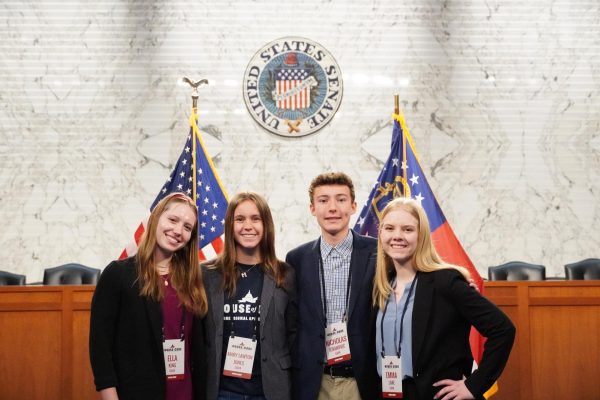Students on Their Experiences With Fluctuating Mental Health
As these demanding and stressful times continue, Chamblee is left to tackle one of many COVID-induced dilemmas: students’ mental health. With their emotional states constantly fluctuating, many CCHS students are finding that they must adapt their way of life in order to survive the circumstances.
At Chamblee, the issue at hand has infinitely many perspectives, driven by a set of nuanced and varied student opinions: despite this, one fact is for certain—whether they are falling behind in school or enjoying a more relaxed schedule, Chamblee’s student body has, in wake of the pandemic, undergone drastic changes to their mental health.
Virtual Versus in-Person School
Students’ varying viewpoints on virtual and in-person school are based on stress and time management: in regards to stress, students have reported experiencing anxiety from heavy workloads, issues with understanding the curriculum, and possible outbreaks of the virus itself.
For junior Aleksander Dyer, in-person school is more appealing due to the quality of instruction over video calls.
“I prefer learning in school […], learning online is very unintuitive; two days of class, 45 minutes a day is awful. Assignments are always in different places and I’m forgetting about them,” Dyer said.
Dyer, however, was not surprised by his negative virtual learning experience. Even prior to the start of school in August, he was pessimistic about how online school would work.
“I was expecting it to be this bad, honestly,” Dyer said.
Sophomore Amari Hassan also believes that virtual school is impairing his ability to learn.
“I prefer to be in school because I don’t understand what’s going on in any class,” Hassan said. “They give you work, after work, after work, and I still don’t know what’s going on, and so I’m not learning.”
On the other hand, many students have felt that virtual school has helped them immensely in mitigating their stress. One of these students is senior Neena Katauskas, who found that online school improved her time management.
“Personally, I like online better just because the times are so much more flexible; I get to sleep in […], getting out at 1:50 is perfect because I get to go to tennis a lot now, which I wasn’t able to do when we actually went to school,” said Katauskas. “I also just like being by myself rather than with a lot of people all day every day.”
Furthermore, freshman Luiza Douglas expressed concerns about going back to school in regards to safety.
“If I was in the building, I feel like I would be too anxious about the virus, and I don’t think that would be very good for my mental health. I feel safer at home,” said Douglas.
Mental Health Checkup and Coping Mechanisms
Aside from virtual school’s introduction in August, students’ emotional well-being has been changing since mid-March, when schools first began to close. And as it turns out, during a raging pandemic, there are plenty of health-related pros and social-related cons to staying home.
Despite feeling safer learning online, many students still struggle with other aspects of staying home, such as decreased socialization. When asked about this, Douglas explained the impact of the pandemic on her own well-being.
“[My mental health] has definitely gotten worse, I’ve developed anxiety,” she said.
Despite Douglas’s struggles with her mental health, other students have experienced positive mental developments.
“[My mental health] has definitely changed; it’s gotten better in certain ways and worse in other ways,” said Dyer. “It’s gotten better since I have more free time, and it’s not a seven-hour school day, which is nicer if you’re good at sitting down and getting your work done.”
Likewise, Katauskas has also experienced an improvement in her mental health.
“[My mental health over quarantine] improved 100%. In the beginning, I think it plummeted because I couldn’t see my friends, but then, as tennis drills started to open up again, we got to see each other,” said Katauskas.
Meanwhile, Hassan, who also initially struggled with a lack of social interaction, found that quarantine was an optimal time to start soul-searching.
“I think it’s improved in a way where I know more about myself because I have to spend time with myself now. I know what things work and what things don’t work,” said Hassan. “I know how I can learn and how I can understand things but also it’s kinda bad because you can’t really hang out with people as often. […] You’re having minimal interaction with people.”
Aside from the occasional socially-distanced interaction, Hassan has picked up meditation and other relaxation tactics as coping mechanisms for stress and anxiety.
“Sleep and meditation [have played a large role]. I might go outside because when you’re outside you’re more in touch with nature, and I like that kind of meditation,” said Hassan. “Sometimes I’ll be in a dark room with incense, and [I] focus on the smell of the incense and nothing else and then go into a meditative state like that.”
The Senior Experience
For many seniors, their last year of high school is taking a considerable toll on their mental health—especially considering the daunting college application process that lies ahead, along with their overall “senior experience,” or lack thereof.
“It’s pretty stressful; there’s not much guidance, we only get a 30-minute call with our counselors, and it’s definitely a lot more than what a lot of us thought it would be,” said senior Mary Kate Reid, referring to the college application process.
In terms of the traditional and often glorified senior experience, Reid felt that this year has turned out to be quite disappointing for the class of 2021.
“It’s different; the teachers are sympathetic, and they feel bad for us, so they’re trying to make it the best experience that they can, […] but it’s pretty sad, I’m not gonna lie,” said Reid.
And like other students, Reid explained that social isolation has been her biggest issue with combating this pandemic.
“I think it’s the fact of being isolated like this for the first time, we’re so used to going to school and seeing everyone every day, going to practice after, or going to Starbucks to do our homework together, but now it’s just very lonely,” she said.
Lowering Personal Expectations
Now that circumstances have changed so drastically, many students have also lowered their expectations for themselves.
“The [expectations] have definitely loosened. Going into school sophomore year, I kind of forgot [about school]. My goal was to have a decent GPA, like a 3.0-3.5, which is probably not going to happen. I’ve just learned to understand that sometimes you can’t do everything,” said Hassan.
In terms of academics, Dyer has learned to be more lenient with managing his productivity.
“I would say [my expectations for myself] have loosened. There’s so much spare time during [the] day that I […] go easy on myself in terms of productivity,” said Dyer.
Like Dyer, Douglas also realized that time was a major factor in her personal expectations.
“I used to be really strict with my schedule, and now I’m just like ‘Oh, let’s wake up whenever, I don’t really care,’” she said.
Looking at students’ general experiences, it is clear that although many are struggling, they are also getting through this pandemic one day at a time.
“It’s manageable; it’s a lot, but that was expected,” said Katauskas.
—
Mental Health Resources:
National Suicide Prevention Lifeline: 800-273-8255
Depression Hotline: 630-482-9696
Grief Support Hotline: 650-321-5272
Mental Health Hotline: 800-622-4357
Self Abuse Hotline: 800-366-8288
Local Resource for Chamblee students: chambleecares.org
Your donation will support the student journalists of Chamblee High School Blue & Gold. Your contribution will allow us to print editions of our work and cover our annual website hosting costs. Currently, we are working to fund a Halloween satire edition.

Allison Lvovich is a senior, and this is her second year in journalism. In her spare time, she plays/teaches tennis and plays chess. In 5 years time, she sees herself doing something related to statistics. One movie that encapsulates her Chamblee experience is "Legally Blonde."

Lucy Samuels is a senior and has been working as a staff writer for two years. She sees herself in five years working for some sort of video game company. The show that represents high school to her is "Game of Thrones."










